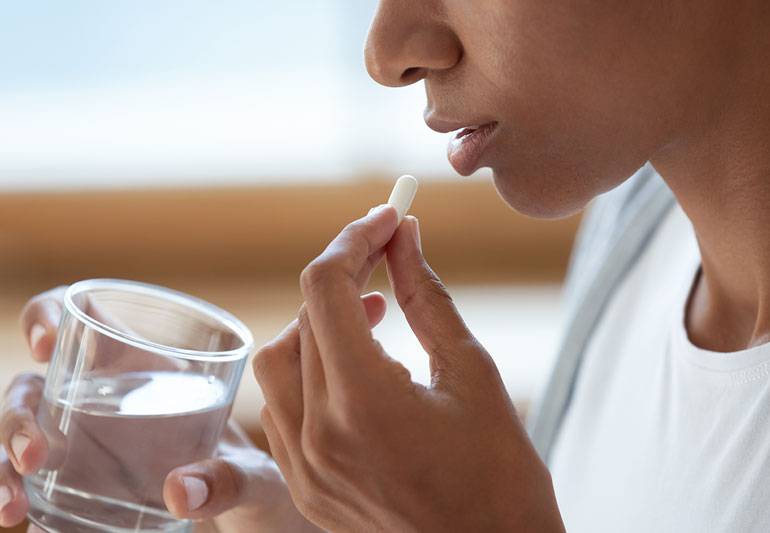

You know the feeling: You toss and turn, night after night and nothing seems to quite do the trick. You’ve tried over-the-counter sleep aids and even some supplements, but you’re beginning to wonder if there’s a more natural way to get some extra zzz’s.
One avenue some people explore involves vitamins and supplements. We get them via food and drinks and many of us take over-the-counter vitamins and supplements. Is there a certain vitamin or combination of supplements that could help induce sleep so we don’t have to rely on prescription medications?
We spoke with integrative medicine specialist Naoki Umeda, MD, to find out more about what we do and don’t know about vitamins and supplements for sleep and whether certain products can offer hope – or do more harm.
Can vitamins help you sleep?
According to Dr. Umeda, “While some natural remedies such as melatonin, valerian, magnesium or chamomile tea may help for some people, there’s no definitive evidence from randomized controlled trials these are effective for typical insomnia,” he says.
There are, though, some supplements that may help, but you should consult your healthcare provider for more information.
- Melatonin is a hormone that’s related to sleep control. While it may be effective for shift work sleep disorder or jet lag, it hasn’t been found to aid typical insomnia. It may increase the effect of warfarin (a blood thinner), and it should not be used if you are pregnant.
- Valerian is an herb that may help improve sleep quality. It is considered safe if you take in recommended doses, but don’t use if you are pregnant.
- Magnesium glycinate or magnesium citrate may also help improve sleep quality by changing the amount of some neurotransmitters that have a calming effect. Taking excessive amounts, however, can cause digestive issues like diarrhea. It can be used while you are pregnant, but please consult your Ob/Gyn.
- Chamomile tea may help you fall asleep and it’s generally considered safe.
Again, although these may be helpful, there are only a handful of well-designed studies with inconclusive results. More research is definitely needed.
Can vitamin deficiencies affect your sleep?
Another area where there has been preliminary research is on how certain vitamins – or lack thereof – could adversely affect your sleep.
A 2018 study showed a potential link between vitamin D deficiency and sleep disorders. Given other data available about the effects of vitamin D deficiency, this connection doesn’t seem that surprising. But even the researchers behind the study admitted the conclusions were “controversial” and said more studies are needed to confirm the link. “That connection might be correct, but it could be just one of several factors,” says Dr. Umeda.
It’s possible that other vitamin deficiencies could indirectly lead to poor sleep. For instance, iron deficiency is considered a potential cause of restless legs syndrome which can interrupt sleep. But, as with the other studies mentioned here, there’s just not enough evidence.
The bottom line
Whatever you may hear or read, there’s just not enough evidence to back any strong connection between vitamins, supplements, and sleep. Melatonin, valerian, magnesium, or chamomile tea may be helpful and are usually safe but they might not work for everyone.
If you can, suggests Dr. Umeda, do your best to get most of your vitamins from a healthy, balanced diet rather than supplements. “Overdoing vitamins or taking a combination of various vitamins may affect sleep,” he says.
“If your diet is healthy, though, your body will absorb an adequate amount of most vitamins. In addition, simple lifestyle changes can improve your sleep. Meditation, deep breathing, or aromatherapy and essential oils may help,” he adds. “It is also recommended to limit caffeine, create a dark, quiet and cool sleeping environment and not use smartphones, tablets or laptop computers for at least one hour before going to sleep.”
Check with your healthcare provider to see if taking a multivitamin or a daily dose of a specific vitamin is necessary for you, particularly if you may need several different vitamins. And, Dr. Umeda notes, be sure to check with your healthcare provider if you want to take or are taking certain vitamins or supplements for your sleep issues.
more recommended stories
 Nanoplastics in Brain Tissue and Neurological Risk
Nanoplastics in Brain Tissue and Neurological RiskKey Takeaways for HCPs Nanoplastics are.
 AI Predicts Chronic GVHD Risk After Stem Cell Transplant
AI Predicts Chronic GVHD Risk After Stem Cell TransplantKey Takeaways A new AI-driven tool,.
 Red Meat Consumption Linked to Higher Diabetes Odds
Red Meat Consumption Linked to Higher Diabetes OddsKey Takeaways Higher intake of total,.
 Pediatric Crohn’s Disease Microbial Signature Identified
Pediatric Crohn’s Disease Microbial Signature IdentifiedKey Points at a Glance NYU.
 Nanovaccine Design Boosts Immune Attack on HPV Tumors
Nanovaccine Design Boosts Immune Attack on HPV TumorsKey Highlights Reconfiguring peptide orientation significantly.
 High-Fat Diets Cause Damage to Metabolic Health
High-Fat Diets Cause Damage to Metabolic HealthKey Points Takeaways High-fat and ketogenic.
 Acute Ischemic Stroke: New Evidence for Neuroprotection
Acute Ischemic Stroke: New Evidence for NeuroprotectionKey Highlights A Phase III clinical.
 Statins Rarely Cause Side Effects, Large Trials Show
Statins Rarely Cause Side Effects, Large Trials ShowKey Points at a Glance Large.
 Anxiety Reduction and Emotional Support on Social Media
Anxiety Reduction and Emotional Support on Social MediaKey Summary Anxiety commonly begins in.
 Liquid Biopsy Measures Epigenetic Instability in Cancer
Liquid Biopsy Measures Epigenetic Instability in CancerKey Takeaways Johns Hopkins researchers developed.

Leave a Comment